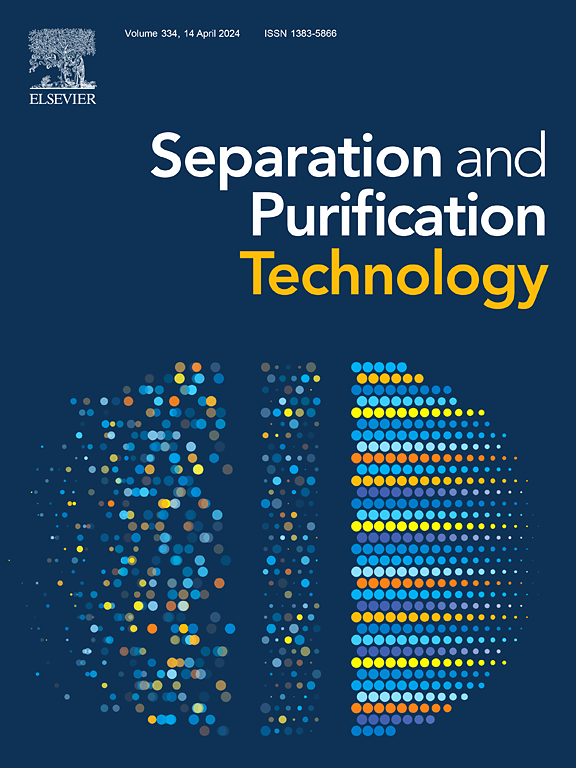Analytical framework for nanofiltration processes with imperfect rejection and its application to curcumin concentration
IF 8.1
1区 工程技术
Q1 ENGINEERING, CHEMICAL
引用次数: 0
Abstract
Organic solvent nanofiltration (OSN) performance is influenced by several factors, including the solvent, membrane, transmembrane pressure, system size, flowrate, and desired end concentration. System design and optimization of such a complex process requires a unified framework so that the effect of each influence can be compared quantitatively in a single plot. To that effect, a mathematical framework was derived by functionally relating the target quantities (solute yield and solvent recovery) interconnected by the mass balances of each species. The plot obtained indicates solute-solvent selectivity, solute yield, solvent recovery, closeness to the saturation concentration, and a comparison of system sizes; hence when plotted for varied operating conditions and solvent-membrane systems, such a plot is instructive to improved system design. In the current paper, this framework is illustrated for OSN implemented for curcumin extract concentration. Two membranes (Evonik Puramem Performance, PMP, and Evonik Puramem Selective, PMS) were compared at various pressures on a single plot. The key output values obtained are solute yield, solvent recovery, system size comparison, and permeate bulk solute concentration. It was shown using the framework that when operated at 10 bar, the PMS membrane has a higher solute yield (180%); however, it requires a larger membrane area (25%) to reach saturation, compared to PMP. Finally, the effect of concentration polarization on the separation is demonstrated using the framework.

具有不完全排斥的纳滤过程的分析框架及其在姜黄素浓缩中的应用
有机溶剂纳滤(OSN)的性能受多种因素影响,包括溶剂、膜、跨膜压力、系统尺寸、流速和所需的最终浓度。要对如此复杂的过程进行系统设计和优化,就需要一个统一的框架,这样才能在一张图上对每种影响因素的效果进行定量比较。为此,通过将目标量(溶质产率和溶剂回收率)与每种物质的质量平衡相互关联,得出了一个数学框架。所得到的曲线图显示了溶质-溶剂选择性、溶质产率、溶剂回收率、与饱和浓度的接近程度以及系统大小的比较;因此,在绘制不同操作条件和溶剂-膜系统的曲线图时,这种曲线图对改进系统设计具有指导意义。本文对姜黄素提取物浓缩 OSN 框架进行了说明。在一张图上对两种膜(Evonik Puramem Performance,PMP 和 Evonik Puramem Selective,PMS)在不同压力下的性能进行了比较。获得的关键输出值包括溶质产率、溶剂回收、系统尺寸比较和渗透物体积溶质浓度。该框架显示,在 10 巴压力下运行时,PMS 膜的溶质产率更高(180%);但与 PMP 相比,PMS 膜需要更大的膜面积(25%)才能达到饱和。最后,使用框架演示了浓度极化对分离的影响。
本文章由计算机程序翻译,如有差异,请以英文原文为准。
求助全文
约1分钟内获得全文
求助全文
来源期刊

Separation and Purification Technology
工程技术-工程:化工
CiteScore
14.00
自引率
12.80%
发文量
2347
审稿时长
43 days
期刊介绍:
Separation and Purification Technology is a premier journal committed to sharing innovative methods for separation and purification in chemical and environmental engineering, encompassing both homogeneous solutions and heterogeneous mixtures. Our scope includes the separation and/or purification of liquids, vapors, and gases, as well as carbon capture and separation techniques. However, it's important to note that methods solely intended for analytical purposes are not within the scope of the journal. Additionally, disciplines such as soil science, polymer science, and metallurgy fall outside the purview of Separation and Purification Technology. Join us in advancing the field of separation and purification methods for sustainable solutions in chemical and environmental engineering.
 求助内容:
求助内容: 应助结果提醒方式:
应助结果提醒方式:


